Managing Across Cultures Report: Cross-Cultural Management Strategies
VerifiedAdded on 2022/12/23
|15
|5163
|35
Report
AI Summary
This report delves into the multifaceted realm of managing across cultures, with a specific focus on the challenges and strategies within international business, using the Tesco case study. It begins with an introduction to globalization and the significance of cross-cultural management, emphasizing the need for effective strategies in multinational corporations. The report explores various cultural theories, including Hofstede's and Handy's models, providing insights into cultural dimensions and their impact on organizational behavior. It introduces the EPRG framework, analyzing ethnocentric, polycentric, regiocentric and geocentric approaches to international marketing and management. The main body addresses problems that arise due to cross-cultural differences, such as work stress, communication barriers, decision-making difficulties, and conflict. The report then proposes strategies to mitigate these issues, with relevance to motivation, negotiations, decision making, communication, and leadership. The report concludes with a summary of key findings and insights into effective cross-cultural management practices. References are provided at the end.
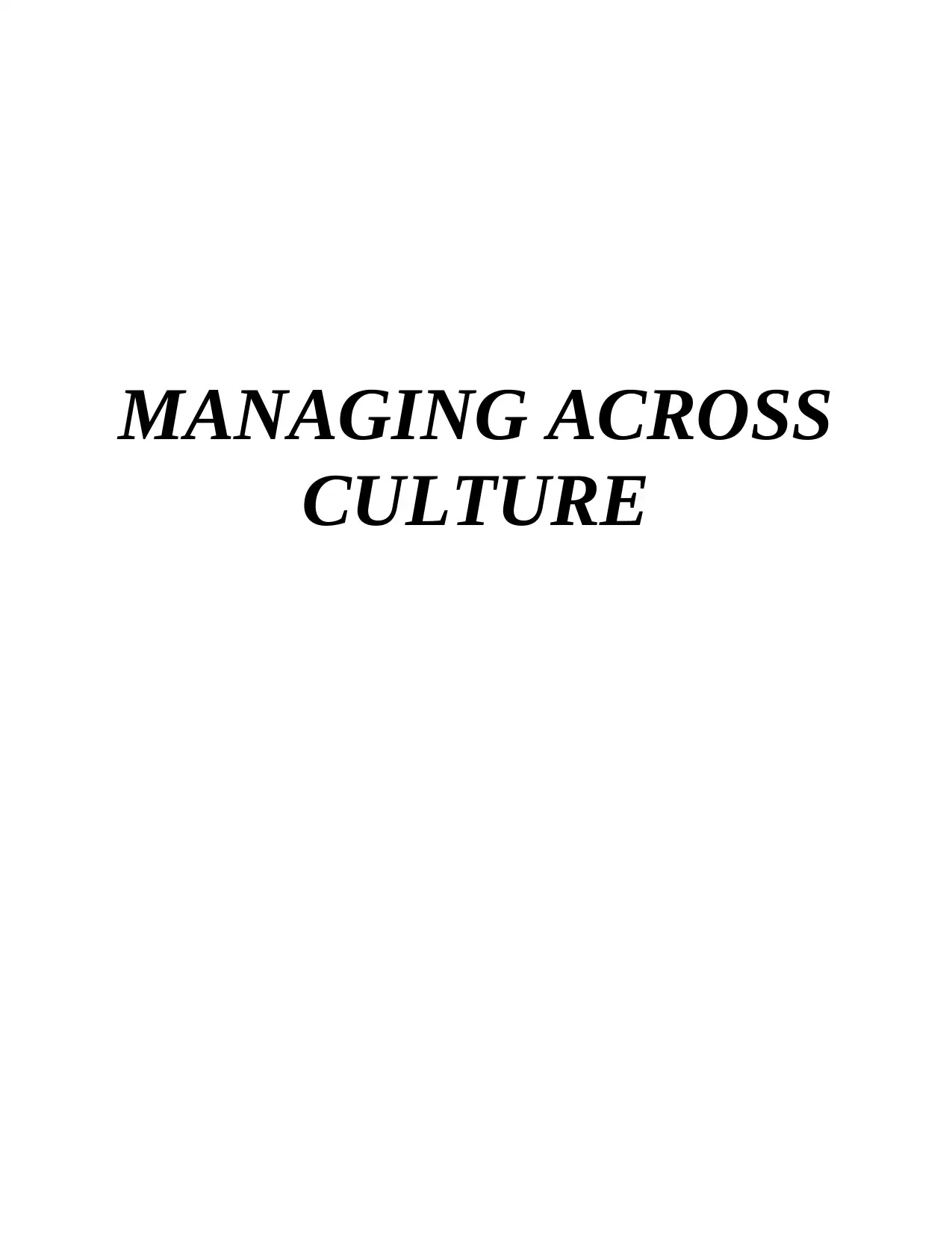
MANAGING ACROSS
CULTURE
CULTURE
Paraphrase This Document
Need a fresh take? Get an instant paraphrase of this document with our AI Paraphraser
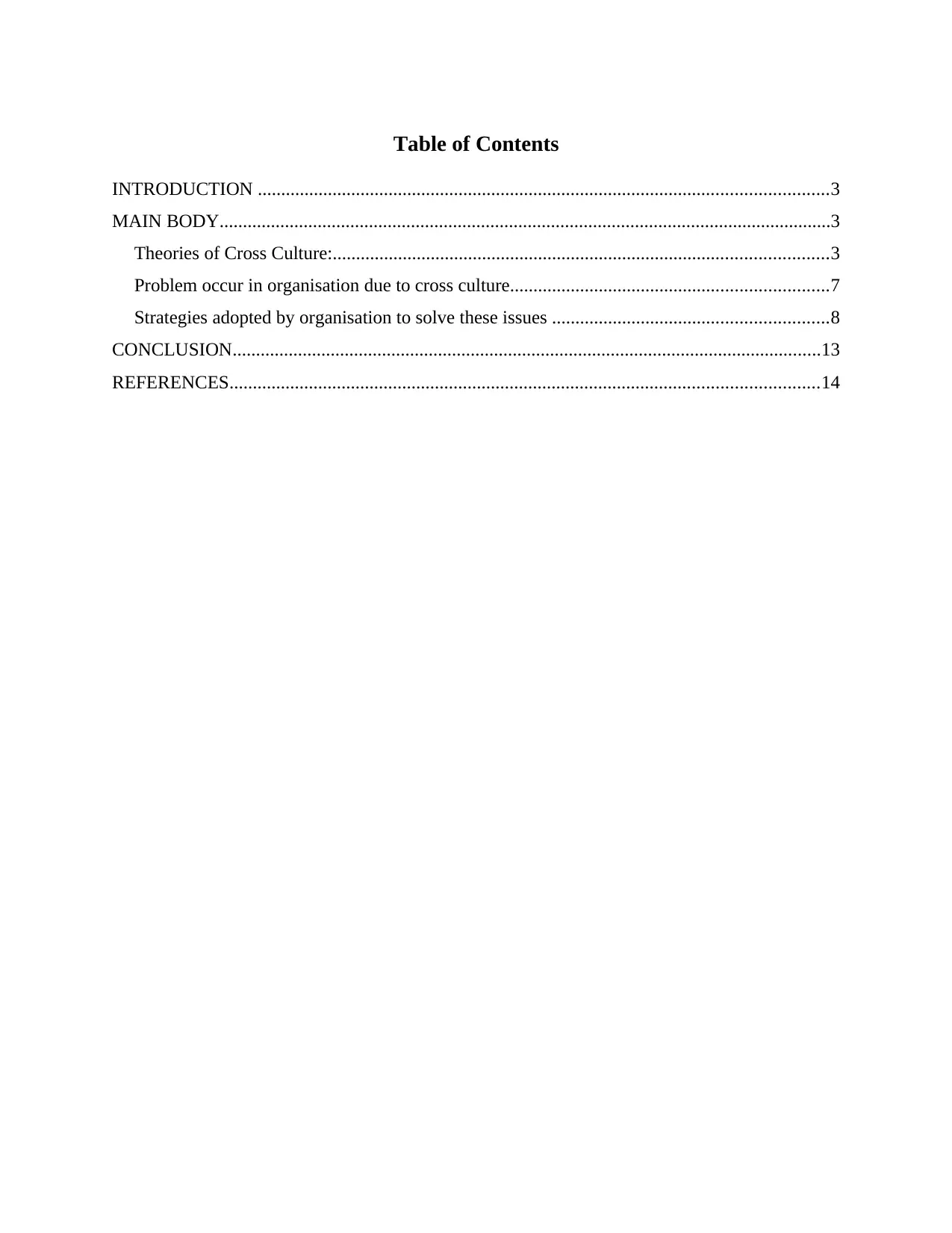
Table of Contents
INTRODUCTION ..........................................................................................................................3
MAIN BODY...................................................................................................................................3
Theories of Cross Culture:..........................................................................................................3
Problem occur in organisation due to cross culture....................................................................7
Strategies adopted by organisation to solve these issues ...........................................................8
CONCLUSION..............................................................................................................................13
REFERENCES..............................................................................................................................14
INTRODUCTION ..........................................................................................................................3
MAIN BODY...................................................................................................................................3
Theories of Cross Culture:..........................................................................................................3
Problem occur in organisation due to cross culture....................................................................7
Strategies adopted by organisation to solve these issues ...........................................................8
CONCLUSION..............................................................................................................................13
REFERENCES..............................................................................................................................14
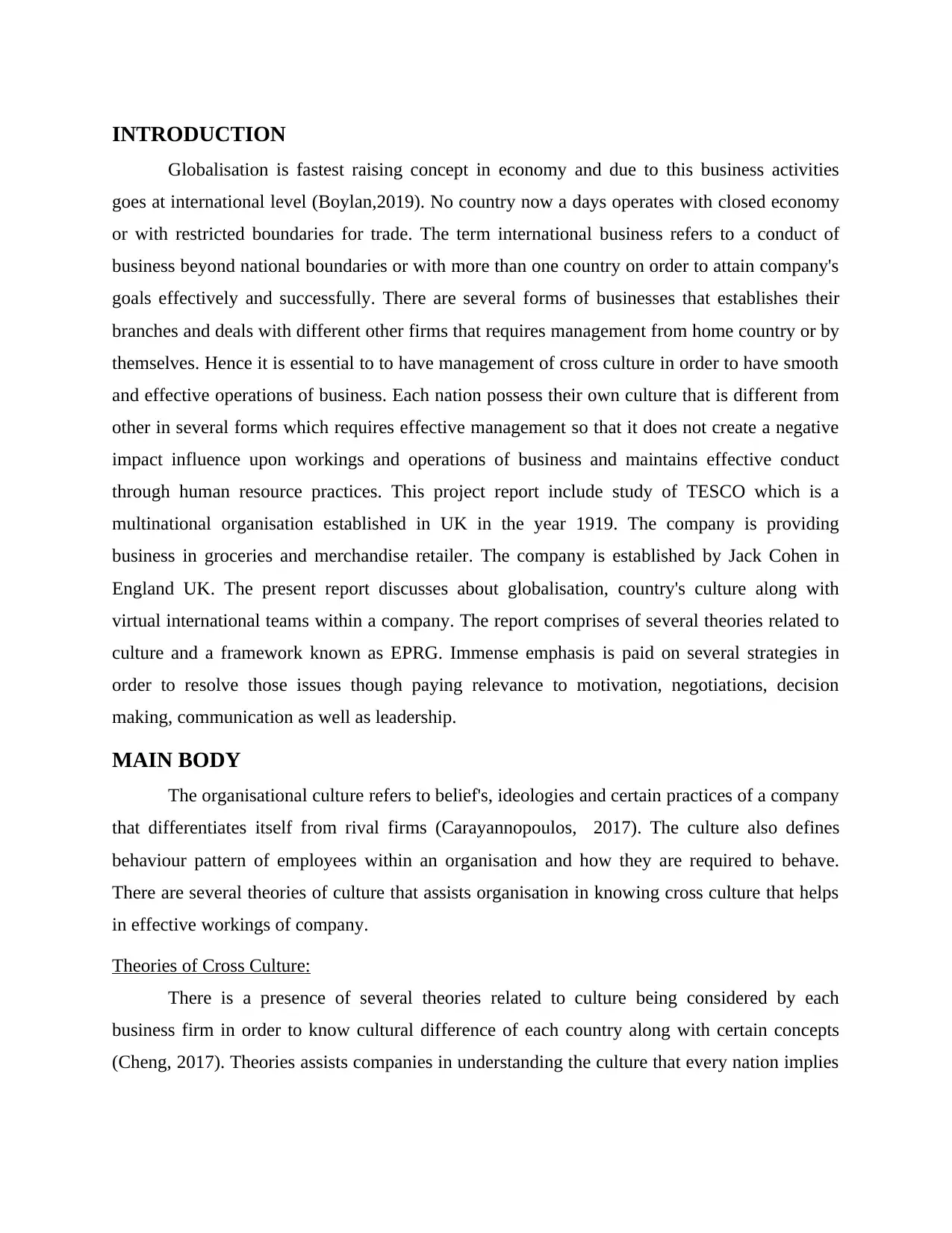
INTRODUCTION
Globalisation is fastest raising concept in economy and due to this business activities
goes at international level (Boylan,2019). No country now a days operates with closed economy
or with restricted boundaries for trade. The term international business refers to a conduct of
business beyond national boundaries or with more than one country on order to attain company's
goals effectively and successfully. There are several forms of businesses that establishes their
branches and deals with different other firms that requires management from home country or by
themselves. Hence it is essential to to have management of cross culture in order to have smooth
and effective operations of business. Each nation possess their own culture that is different from
other in several forms which requires effective management so that it does not create a negative
impact influence upon workings and operations of business and maintains effective conduct
through human resource practices. This project report include study of TESCO which is a
multinational organisation established in UK in the year 1919. The company is providing
business in groceries and merchandise retailer. The company is established by Jack Cohen in
England UK. The present report discusses about globalisation, country's culture along with
virtual international teams within a company. The report comprises of several theories related to
culture and a framework known as EPRG. Immense emphasis is paid on several strategies in
order to resolve those issues though paying relevance to motivation, negotiations, decision
making, communication as well as leadership.
MAIN BODY
The organisational culture refers to belief's, ideologies and certain practices of a company
that differentiates itself from rival firms (Carayannopoulos, 2017). The culture also defines
behaviour pattern of employees within an organisation and how they are required to behave.
There are several theories of culture that assists organisation in knowing cross culture that helps
in effective workings of company.
Theories of Cross Culture:
There is a presence of several theories related to culture being considered by each
business firm in order to know cultural difference of each country along with certain concepts
(Cheng, 2017). Theories assists companies in understanding the culture that every nation implies
Globalisation is fastest raising concept in economy and due to this business activities
goes at international level (Boylan,2019). No country now a days operates with closed economy
or with restricted boundaries for trade. The term international business refers to a conduct of
business beyond national boundaries or with more than one country on order to attain company's
goals effectively and successfully. There are several forms of businesses that establishes their
branches and deals with different other firms that requires management from home country or by
themselves. Hence it is essential to to have management of cross culture in order to have smooth
and effective operations of business. Each nation possess their own culture that is different from
other in several forms which requires effective management so that it does not create a negative
impact influence upon workings and operations of business and maintains effective conduct
through human resource practices. This project report include study of TESCO which is a
multinational organisation established in UK in the year 1919. The company is providing
business in groceries and merchandise retailer. The company is established by Jack Cohen in
England UK. The present report discusses about globalisation, country's culture along with
virtual international teams within a company. The report comprises of several theories related to
culture and a framework known as EPRG. Immense emphasis is paid on several strategies in
order to resolve those issues though paying relevance to motivation, negotiations, decision
making, communication as well as leadership.
MAIN BODY
The organisational culture refers to belief's, ideologies and certain practices of a company
that differentiates itself from rival firms (Carayannopoulos, 2017). The culture also defines
behaviour pattern of employees within an organisation and how they are required to behave.
There are several theories of culture that assists organisation in knowing cross culture that helps
in effective workings of company.
Theories of Cross Culture:
There is a presence of several theories related to culture being considered by each
business firm in order to know cultural difference of each country along with certain concepts
(Cheng, 2017). Theories assists companies in understanding the culture that every nation implies
⊘ This is a preview!⊘
Do you want full access?
Subscribe today to unlock all pages.

Trusted by 1+ million students worldwide
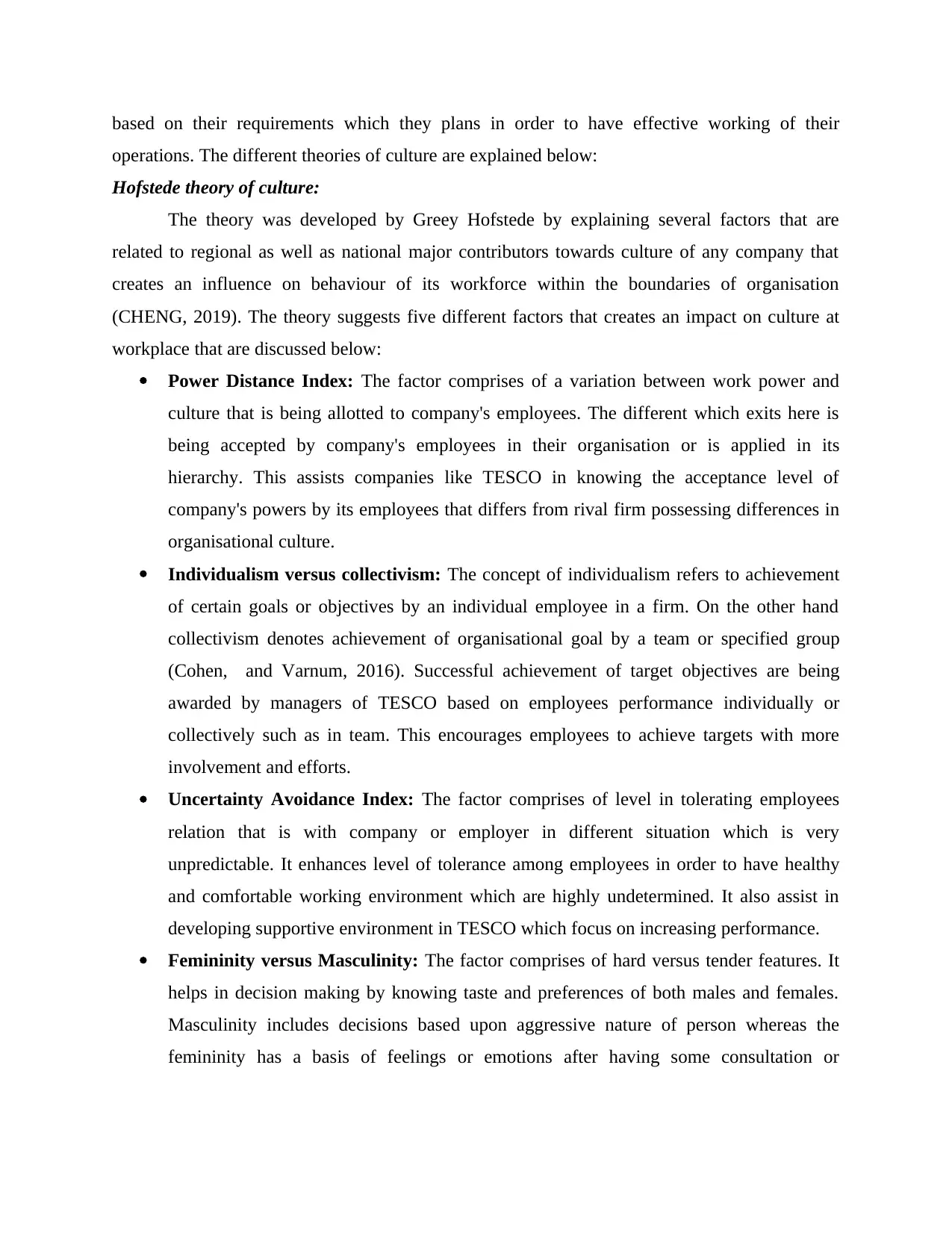
based on their requirements which they plans in order to have effective working of their
operations. The different theories of culture are explained below:
Hofstede theory of culture:
The theory was developed by Greey Hofstede by explaining several factors that are
related to regional as well as national major contributors towards culture of any company that
creates an influence on behaviour of its workforce within the boundaries of organisation
(CHENG, 2019). The theory suggests five different factors that creates an impact on culture at
workplace that are discussed below:
Power Distance Index: The factor comprises of a variation between work power and
culture that is being allotted to company's employees. The different which exits here is
being accepted by company's employees in their organisation or is applied in its
hierarchy. This assists companies like TESCO in knowing the acceptance level of
company's powers by its employees that differs from rival firm possessing differences in
organisational culture.
Individualism versus collectivism: The concept of individualism refers to achievement
of certain goals or objectives by an individual employee in a firm. On the other hand
collectivism denotes achievement of organisational goal by a team or specified group
(Cohen, and Varnum, 2016). Successful achievement of target objectives are being
awarded by managers of TESCO based on employees performance individually or
collectively such as in team. This encourages employees to achieve targets with more
involvement and efforts.
Uncertainty Avoidance Index: The factor comprises of level in tolerating employees
relation that is with company or employer in different situation which is very
unpredictable. It enhances level of tolerance among employees in order to have healthy
and comfortable working environment which are highly undetermined. It also assist in
developing supportive environment in TESCO which focus on increasing performance.
Femininity versus Masculinity: The factor comprises of hard versus tender features. It
helps in decision making by knowing taste and preferences of both males and females.
Masculinity includes decisions based upon aggressive nature of person whereas the
femininity has a basis of feelings or emotions after having some consultation or
operations. The different theories of culture are explained below:
Hofstede theory of culture:
The theory was developed by Greey Hofstede by explaining several factors that are
related to regional as well as national major contributors towards culture of any company that
creates an influence on behaviour of its workforce within the boundaries of organisation
(CHENG, 2019). The theory suggests five different factors that creates an impact on culture at
workplace that are discussed below:
Power Distance Index: The factor comprises of a variation between work power and
culture that is being allotted to company's employees. The different which exits here is
being accepted by company's employees in their organisation or is applied in its
hierarchy. This assists companies like TESCO in knowing the acceptance level of
company's powers by its employees that differs from rival firm possessing differences in
organisational culture.
Individualism versus collectivism: The concept of individualism refers to achievement
of certain goals or objectives by an individual employee in a firm. On the other hand
collectivism denotes achievement of organisational goal by a team or specified group
(Cohen, and Varnum, 2016). Successful achievement of target objectives are being
awarded by managers of TESCO based on employees performance individually or
collectively such as in team. This encourages employees to achieve targets with more
involvement and efforts.
Uncertainty Avoidance Index: The factor comprises of level in tolerating employees
relation that is with company or employer in different situation which is very
unpredictable. It enhances level of tolerance among employees in order to have healthy
and comfortable working environment which are highly undetermined. It also assist in
developing supportive environment in TESCO which focus on increasing performance.
Femininity versus Masculinity: The factor comprises of hard versus tender features. It
helps in decision making by knowing taste and preferences of both males and females.
Masculinity includes decisions based upon aggressive nature of person whereas the
femininity has a basis of feelings or emotions after having some consultation or
Paraphrase This Document
Need a fresh take? Get an instant paraphrase of this document with our AI Paraphraser
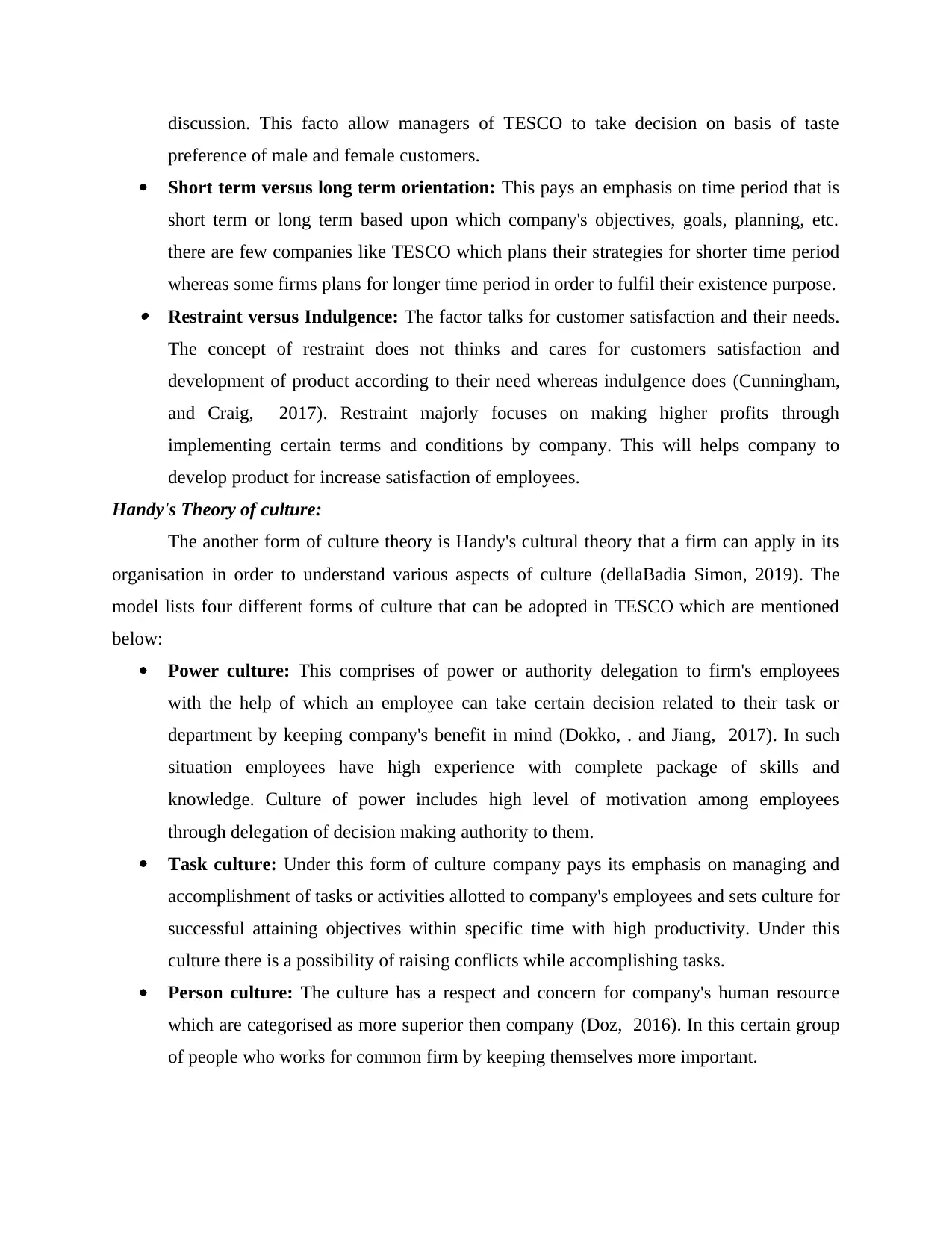
discussion. This facto allow managers of TESCO to take decision on basis of taste
preference of male and female customers.
Short term versus long term orientation: This pays an emphasis on time period that is
short term or long term based upon which company's objectives, goals, planning, etc.
there are few companies like TESCO which plans their strategies for shorter time period
whereas some firms plans for longer time period in order to fulfil their existence purpose. Restraint versus Indulgence: The factor talks for customer satisfaction and their needs.
The concept of restraint does not thinks and cares for customers satisfaction and
development of product according to their need whereas indulgence does (Cunningham,
and Craig, 2017). Restraint majorly focuses on making higher profits through
implementing certain terms and conditions by company. This will helps company to
develop product for increase satisfaction of employees.
Handy's Theory of culture:
The another form of culture theory is Handy's cultural theory that a firm can apply in its
organisation in order to understand various aspects of culture (dellaBadia Simon, 2019). The
model lists four different forms of culture that can be adopted in TESCO which are mentioned
below:
Power culture: This comprises of power or authority delegation to firm's employees
with the help of which an employee can take certain decision related to their task or
department by keeping company's benefit in mind (Dokko, . and Jiang, 2017). In such
situation employees have high experience with complete package of skills and
knowledge. Culture of power includes high level of motivation among employees
through delegation of decision making authority to them.
Task culture: Under this form of culture company pays its emphasis on managing and
accomplishment of tasks or activities allotted to company's employees and sets culture for
successful attaining objectives within specific time with high productivity. Under this
culture there is a possibility of raising conflicts while accomplishing tasks.
Person culture: The culture has a respect and concern for company's human resource
which are categorised as more superior then company (Doz, 2016). In this certain group
of people who works for common firm by keeping themselves more important.
preference of male and female customers.
Short term versus long term orientation: This pays an emphasis on time period that is
short term or long term based upon which company's objectives, goals, planning, etc.
there are few companies like TESCO which plans their strategies for shorter time period
whereas some firms plans for longer time period in order to fulfil their existence purpose. Restraint versus Indulgence: The factor talks for customer satisfaction and their needs.
The concept of restraint does not thinks and cares for customers satisfaction and
development of product according to their need whereas indulgence does (Cunningham,
and Craig, 2017). Restraint majorly focuses on making higher profits through
implementing certain terms and conditions by company. This will helps company to
develop product for increase satisfaction of employees.
Handy's Theory of culture:
The another form of culture theory is Handy's cultural theory that a firm can apply in its
organisation in order to understand various aspects of culture (dellaBadia Simon, 2019). The
model lists four different forms of culture that can be adopted in TESCO which are mentioned
below:
Power culture: This comprises of power or authority delegation to firm's employees
with the help of which an employee can take certain decision related to their task or
department by keeping company's benefit in mind (Dokko, . and Jiang, 2017). In such
situation employees have high experience with complete package of skills and
knowledge. Culture of power includes high level of motivation among employees
through delegation of decision making authority to them.
Task culture: Under this form of culture company pays its emphasis on managing and
accomplishment of tasks or activities allotted to company's employees and sets culture for
successful attaining objectives within specific time with high productivity. Under this
culture there is a possibility of raising conflicts while accomplishing tasks.
Person culture: The culture has a respect and concern for company's human resource
which are categorised as more superior then company (Doz, 2016). In this certain group
of people who works for common firm by keeping themselves more important.
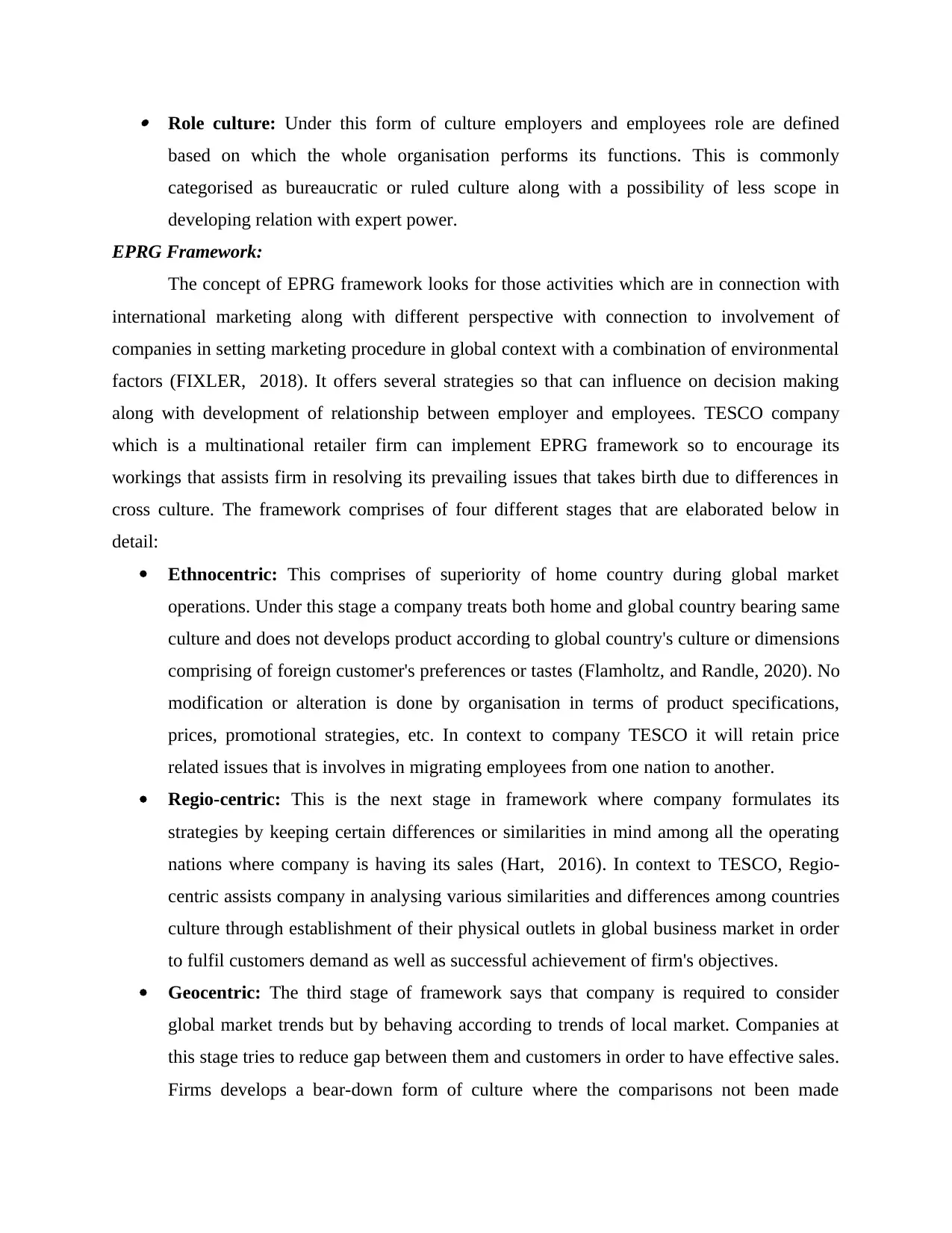
Role culture: Under this form of culture employers and employees role are defined
based on which the whole organisation performs its functions. This is commonly
categorised as bureaucratic or ruled culture along with a possibility of less scope in
developing relation with expert power.
EPRG Framework:
The concept of EPRG framework looks for those activities which are in connection with
international marketing along with different perspective with connection to involvement of
companies in setting marketing procedure in global context with a combination of environmental
factors (FIXLER, 2018). It offers several strategies so that can influence on decision making
along with development of relationship between employer and employees. TESCO company
which is a multinational retailer firm can implement EPRG framework so to encourage its
workings that assists firm in resolving its prevailing issues that takes birth due to differences in
cross culture. The framework comprises of four different stages that are elaborated below in
detail:
Ethnocentric: This comprises of superiority of home country during global market
operations. Under this stage a company treats both home and global country bearing same
culture and does not develops product according to global country's culture or dimensions
comprising of foreign customer's preferences or tastes (Flamholtz, and Randle, 2020). No
modification or alteration is done by organisation in terms of product specifications,
prices, promotional strategies, etc. In context to company TESCO it will retain price
related issues that is involves in migrating employees from one nation to another.
Regio-centric: This is the next stage in framework where company formulates its
strategies by keeping certain differences or similarities in mind among all the operating
nations where company is having its sales (Hart, 2016). In context to TESCO, Regio-
centric assists company in analysing various similarities and differences among countries
culture through establishment of their physical outlets in global business market in order
to fulfil customers demand as well as successful achievement of firm's objectives.
Geocentric: The third stage of framework says that company is required to consider
global market trends but by behaving according to trends of local market. Companies at
this stage tries to reduce gap between them and customers in order to have effective sales.
Firms develops a bear-down form of culture where the comparisons not been made
based on which the whole organisation performs its functions. This is commonly
categorised as bureaucratic or ruled culture along with a possibility of less scope in
developing relation with expert power.
EPRG Framework:
The concept of EPRG framework looks for those activities which are in connection with
international marketing along with different perspective with connection to involvement of
companies in setting marketing procedure in global context with a combination of environmental
factors (FIXLER, 2018). It offers several strategies so that can influence on decision making
along with development of relationship between employer and employees. TESCO company
which is a multinational retailer firm can implement EPRG framework so to encourage its
workings that assists firm in resolving its prevailing issues that takes birth due to differences in
cross culture. The framework comprises of four different stages that are elaborated below in
detail:
Ethnocentric: This comprises of superiority of home country during global market
operations. Under this stage a company treats both home and global country bearing same
culture and does not develops product according to global country's culture or dimensions
comprising of foreign customer's preferences or tastes (Flamholtz, and Randle, 2020). No
modification or alteration is done by organisation in terms of product specifications,
prices, promotional strategies, etc. In context to company TESCO it will retain price
related issues that is involves in migrating employees from one nation to another.
Regio-centric: This is the next stage in framework where company formulates its
strategies by keeping certain differences or similarities in mind among all the operating
nations where company is having its sales (Hart, 2016). In context to TESCO, Regio-
centric assists company in analysing various similarities and differences among countries
culture through establishment of their physical outlets in global business market in order
to fulfil customers demand as well as successful achievement of firm's objectives.
Geocentric: The third stage of framework says that company is required to consider
global market trends but by behaving according to trends of local market. Companies at
this stage tries to reduce gap between them and customers in order to have effective sales.
Firms develops a bear-down form of culture where the comparisons not been made
⊘ This is a preview!⊘
Do you want full access?
Subscribe today to unlock all pages.

Trusted by 1+ million students worldwide
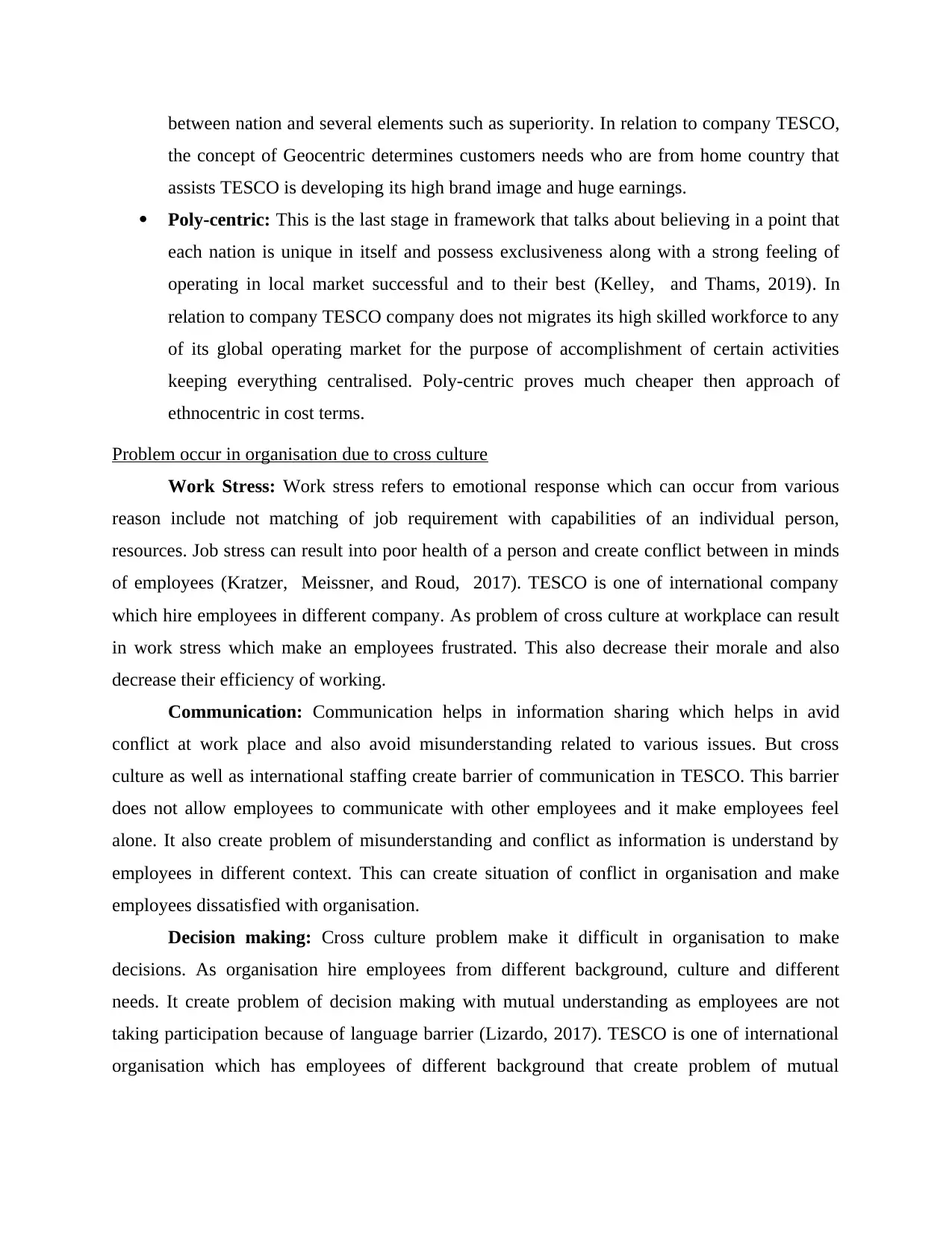
between nation and several elements such as superiority. In relation to company TESCO,
the concept of Geocentric determines customers needs who are from home country that
assists TESCO is developing its high brand image and huge earnings.
Poly-centric: This is the last stage in framework that talks about believing in a point that
each nation is unique in itself and possess exclusiveness along with a strong feeling of
operating in local market successful and to their best (Kelley, and Thams, 2019). In
relation to company TESCO company does not migrates its high skilled workforce to any
of its global operating market for the purpose of accomplishment of certain activities
keeping everything centralised. Poly-centric proves much cheaper then approach of
ethnocentric in cost terms.
Problem occur in organisation due to cross culture
Work Stress: Work stress refers to emotional response which can occur from various
reason include not matching of job requirement with capabilities of an individual person,
resources. Job stress can result into poor health of a person and create conflict between in minds
of employees (Kratzer, Meissner, and Roud, 2017). TESCO is one of international company
which hire employees in different company. As problem of cross culture at workplace can result
in work stress which make an employees frustrated. This also decrease their morale and also
decrease their efficiency of working.
Communication: Communication helps in information sharing which helps in avid
conflict at work place and also avoid misunderstanding related to various issues. But cross
culture as well as international staffing create barrier of communication in TESCO. This barrier
does not allow employees to communicate with other employees and it make employees feel
alone. It also create problem of misunderstanding and conflict as information is understand by
employees in different context. This can create situation of conflict in organisation and make
employees dissatisfied with organisation.
Decision making: Cross culture problem make it difficult in organisation to make
decisions. As organisation hire employees from different background, culture and different
needs. It create problem of decision making with mutual understanding as employees are not
taking participation because of language barrier (Lizardo, 2017). TESCO is one of international
organisation which has employees of different background that create problem of mutual
the concept of Geocentric determines customers needs who are from home country that
assists TESCO is developing its high brand image and huge earnings.
Poly-centric: This is the last stage in framework that talks about believing in a point that
each nation is unique in itself and possess exclusiveness along with a strong feeling of
operating in local market successful and to their best (Kelley, and Thams, 2019). In
relation to company TESCO company does not migrates its high skilled workforce to any
of its global operating market for the purpose of accomplishment of certain activities
keeping everything centralised. Poly-centric proves much cheaper then approach of
ethnocentric in cost terms.
Problem occur in organisation due to cross culture
Work Stress: Work stress refers to emotional response which can occur from various
reason include not matching of job requirement with capabilities of an individual person,
resources. Job stress can result into poor health of a person and create conflict between in minds
of employees (Kratzer, Meissner, and Roud, 2017). TESCO is one of international company
which hire employees in different company. As problem of cross culture at workplace can result
in work stress which make an employees frustrated. This also decrease their morale and also
decrease their efficiency of working.
Communication: Communication helps in information sharing which helps in avid
conflict at work place and also avoid misunderstanding related to various issues. But cross
culture as well as international staffing create barrier of communication in TESCO. This barrier
does not allow employees to communicate with other employees and it make employees feel
alone. It also create problem of misunderstanding and conflict as information is understand by
employees in different context. This can create situation of conflict in organisation and make
employees dissatisfied with organisation.
Decision making: Cross culture problem make it difficult in organisation to make
decisions. As organisation hire employees from different background, culture and different
needs. It create problem of decision making with mutual understanding as employees are not
taking participation because of language barrier (Lizardo, 2017). TESCO is one of international
organisation which has employees of different background that create problem of mutual
Paraphrase This Document
Need a fresh take? Get an instant paraphrase of this document with our AI Paraphraser
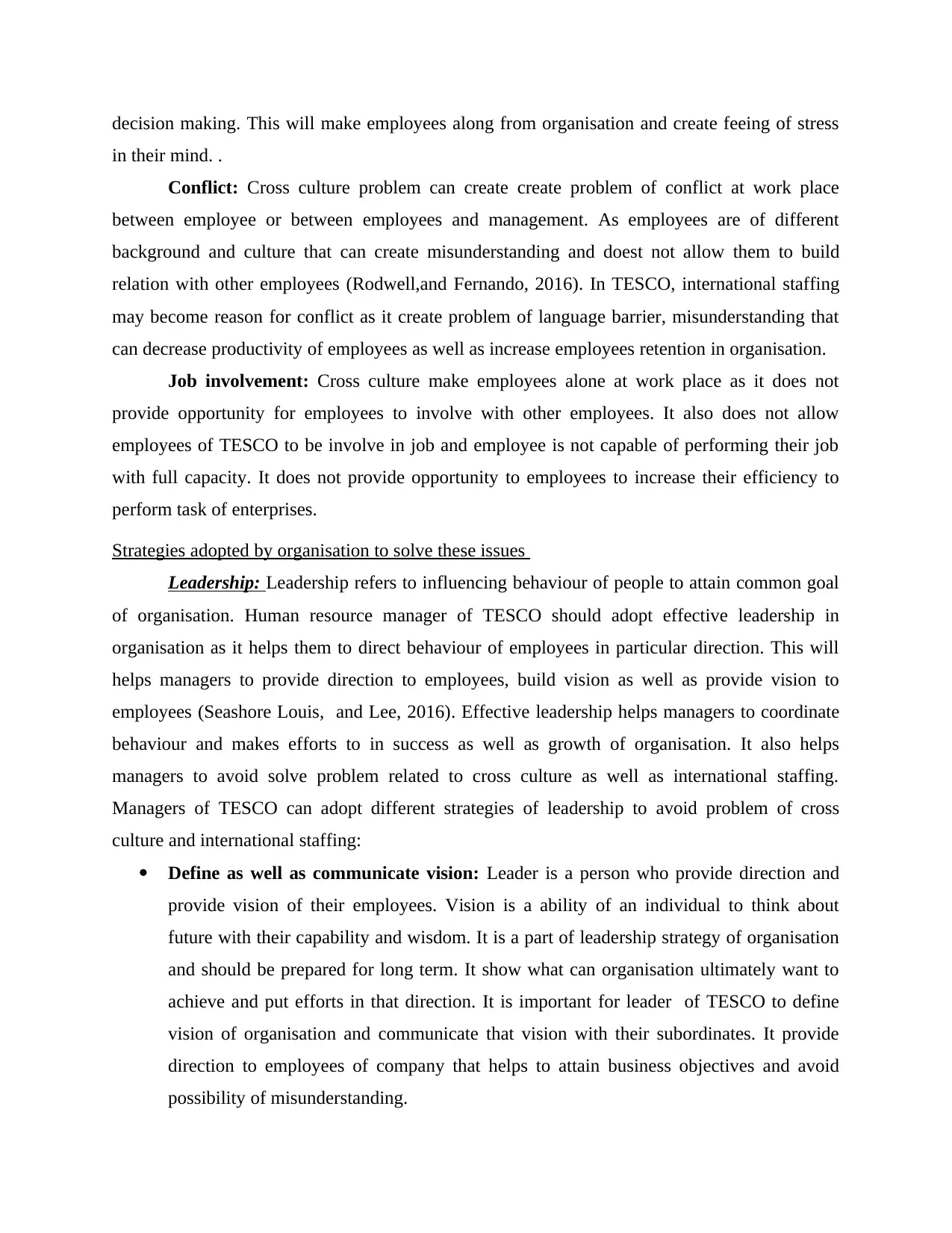
decision making. This will make employees along from organisation and create feeing of stress
in their mind. .
Conflict: Cross culture problem can create create problem of conflict at work place
between employee or between employees and management. As employees are of different
background and culture that can create misunderstanding and doest not allow them to build
relation with other employees (Rodwell,and Fernando, 2016). In TESCO, international staffing
may become reason for conflict as it create problem of language barrier, misunderstanding that
can decrease productivity of employees as well as increase employees retention in organisation.
Job involvement: Cross culture make employees alone at work place as it does not
provide opportunity for employees to involve with other employees. It also does not allow
employees of TESCO to be involve in job and employee is not capable of performing their job
with full capacity. It does not provide opportunity to employees to increase their efficiency to
perform task of enterprises.
Strategies adopted by organisation to solve these issues
Leadership: Leadership refers to influencing behaviour of people to attain common goal
of organisation. Human resource manager of TESCO should adopt effective leadership in
organisation as it helps them to direct behaviour of employees in particular direction. This will
helps managers to provide direction to employees, build vision as well as provide vision to
employees (Seashore Louis, and Lee, 2016). Effective leadership helps managers to coordinate
behaviour and makes efforts to in success as well as growth of organisation. It also helps
managers to avoid solve problem related to cross culture as well as international staffing.
Managers of TESCO can adopt different strategies of leadership to avoid problem of cross
culture and international staffing:
Define as well as communicate vision: Leader is a person who provide direction and
provide vision of their employees. Vision is a ability of an individual to think about
future with their capability and wisdom. It is a part of leadership strategy of organisation
and should be prepared for long term. It show what can organisation ultimately want to
achieve and put efforts in that direction. It is important for leader of TESCO to define
vision of organisation and communicate that vision with their subordinates. It provide
direction to employees of company that helps to attain business objectives and avoid
possibility of misunderstanding.
in their mind. .
Conflict: Cross culture problem can create create problem of conflict at work place
between employee or between employees and management. As employees are of different
background and culture that can create misunderstanding and doest not allow them to build
relation with other employees (Rodwell,and Fernando, 2016). In TESCO, international staffing
may become reason for conflict as it create problem of language barrier, misunderstanding that
can decrease productivity of employees as well as increase employees retention in organisation.
Job involvement: Cross culture make employees alone at work place as it does not
provide opportunity for employees to involve with other employees. It also does not allow
employees of TESCO to be involve in job and employee is not capable of performing their job
with full capacity. It does not provide opportunity to employees to increase their efficiency to
perform task of enterprises.
Strategies adopted by organisation to solve these issues
Leadership: Leadership refers to influencing behaviour of people to attain common goal
of organisation. Human resource manager of TESCO should adopt effective leadership in
organisation as it helps them to direct behaviour of employees in particular direction. This will
helps managers to provide direction to employees, build vision as well as provide vision to
employees (Seashore Louis, and Lee, 2016). Effective leadership helps managers to coordinate
behaviour and makes efforts to in success as well as growth of organisation. It also helps
managers to avoid solve problem related to cross culture as well as international staffing.
Managers of TESCO can adopt different strategies of leadership to avoid problem of cross
culture and international staffing:
Define as well as communicate vision: Leader is a person who provide direction and
provide vision of their employees. Vision is a ability of an individual to think about
future with their capability and wisdom. It is a part of leadership strategy of organisation
and should be prepared for long term. It show what can organisation ultimately want to
achieve and put efforts in that direction. It is important for leader of TESCO to define
vision of organisation and communicate that vision with their subordinates. It provide
direction to employees of company that helps to attain business objectives and avoid
possibility of misunderstanding.
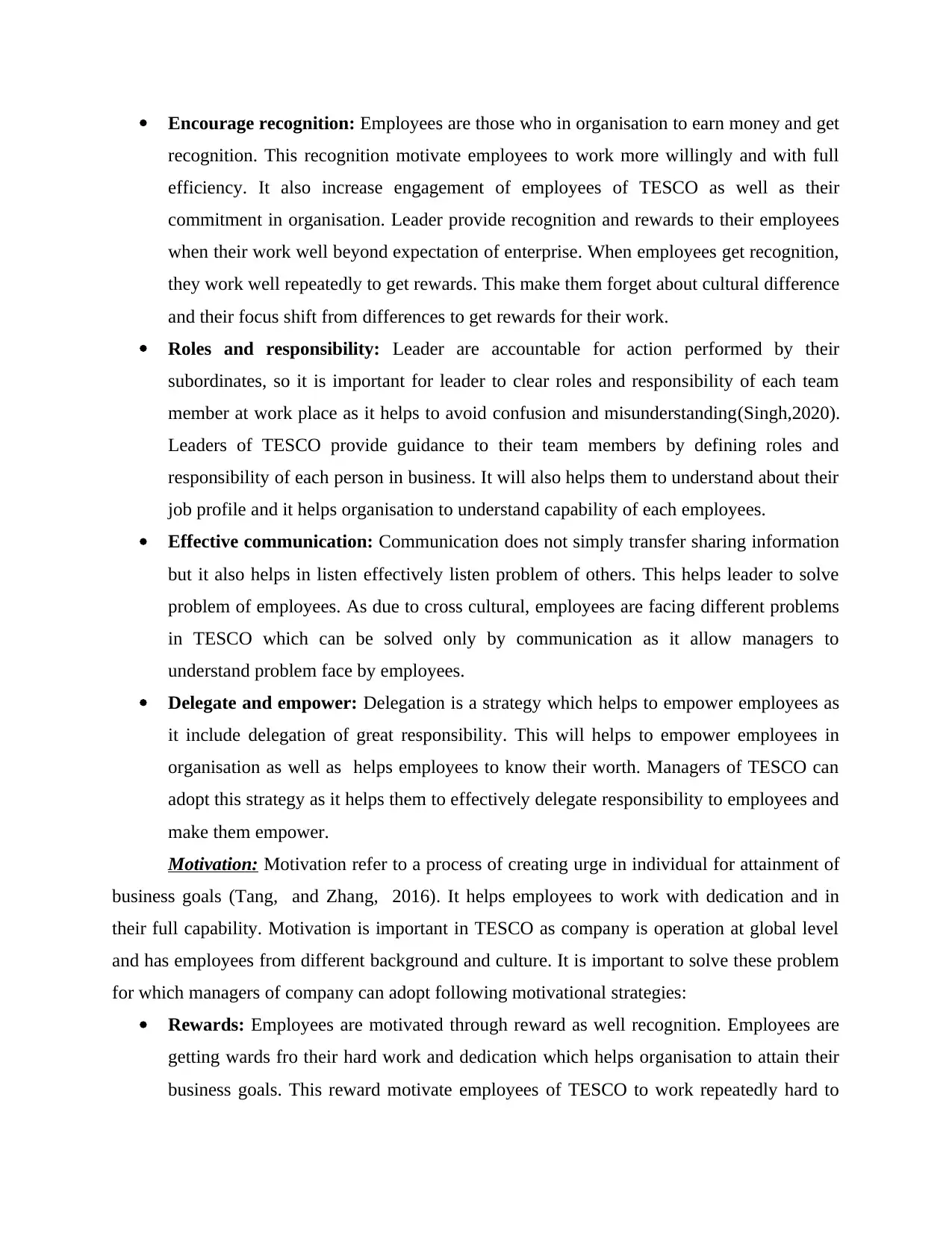
Encourage recognition: Employees are those who in organisation to earn money and get
recognition. This recognition motivate employees to work more willingly and with full
efficiency. It also increase engagement of employees of TESCO as well as their
commitment in organisation. Leader provide recognition and rewards to their employees
when their work well beyond expectation of enterprise. When employees get recognition,
they work well repeatedly to get rewards. This make them forget about cultural difference
and their focus shift from differences to get rewards for their work.
Roles and responsibility: Leader are accountable for action performed by their
subordinates, so it is important for leader to clear roles and responsibility of each team
member at work place as it helps to avoid confusion and misunderstanding(Singh,2020).
Leaders of TESCO provide guidance to their team members by defining roles and
responsibility of each person in business. It will also helps them to understand about their
job profile and it helps organisation to understand capability of each employees.
Effective communication: Communication does not simply transfer sharing information
but it also helps in listen effectively listen problem of others. This helps leader to solve
problem of employees. As due to cross cultural, employees are facing different problems
in TESCO which can be solved only by communication as it allow managers to
understand problem face by employees.
Delegate and empower: Delegation is a strategy which helps to empower employees as
it include delegation of great responsibility. This will helps to empower employees in
organisation as well as helps employees to know their worth. Managers of TESCO can
adopt this strategy as it helps them to effectively delegate responsibility to employees and
make them empower.
Motivation: Motivation refer to a process of creating urge in individual for attainment of
business goals (Tang, and Zhang, 2016). It helps employees to work with dedication and in
their full capability. Motivation is important in TESCO as company is operation at global level
and has employees from different background and culture. It is important to solve these problem
for which managers of company can adopt following motivational strategies:
Rewards: Employees are motivated through reward as well recognition. Employees are
getting wards fro their hard work and dedication which helps organisation to attain their
business goals. This reward motivate employees of TESCO to work repeatedly hard to
recognition. This recognition motivate employees to work more willingly and with full
efficiency. It also increase engagement of employees of TESCO as well as their
commitment in organisation. Leader provide recognition and rewards to their employees
when their work well beyond expectation of enterprise. When employees get recognition,
they work well repeatedly to get rewards. This make them forget about cultural difference
and their focus shift from differences to get rewards for their work.
Roles and responsibility: Leader are accountable for action performed by their
subordinates, so it is important for leader to clear roles and responsibility of each team
member at work place as it helps to avoid confusion and misunderstanding(Singh,2020).
Leaders of TESCO provide guidance to their team members by defining roles and
responsibility of each person in business. It will also helps them to understand about their
job profile and it helps organisation to understand capability of each employees.
Effective communication: Communication does not simply transfer sharing information
but it also helps in listen effectively listen problem of others. This helps leader to solve
problem of employees. As due to cross cultural, employees are facing different problems
in TESCO which can be solved only by communication as it allow managers to
understand problem face by employees.
Delegate and empower: Delegation is a strategy which helps to empower employees as
it include delegation of great responsibility. This will helps to empower employees in
organisation as well as helps employees to know their worth. Managers of TESCO can
adopt this strategy as it helps them to effectively delegate responsibility to employees and
make them empower.
Motivation: Motivation refer to a process of creating urge in individual for attainment of
business goals (Tang, and Zhang, 2016). It helps employees to work with dedication and in
their full capability. Motivation is important in TESCO as company is operation at global level
and has employees from different background and culture. It is important to solve these problem
for which managers of company can adopt following motivational strategies:
Rewards: Employees are motivated through reward as well recognition. Employees are
getting wards fro their hard work and dedication which helps organisation to attain their
business goals. This reward motivate employees of TESCO to work repeatedly hard to
⊘ This is a preview!⊘
Do you want full access?
Subscribe today to unlock all pages.

Trusted by 1+ million students worldwide
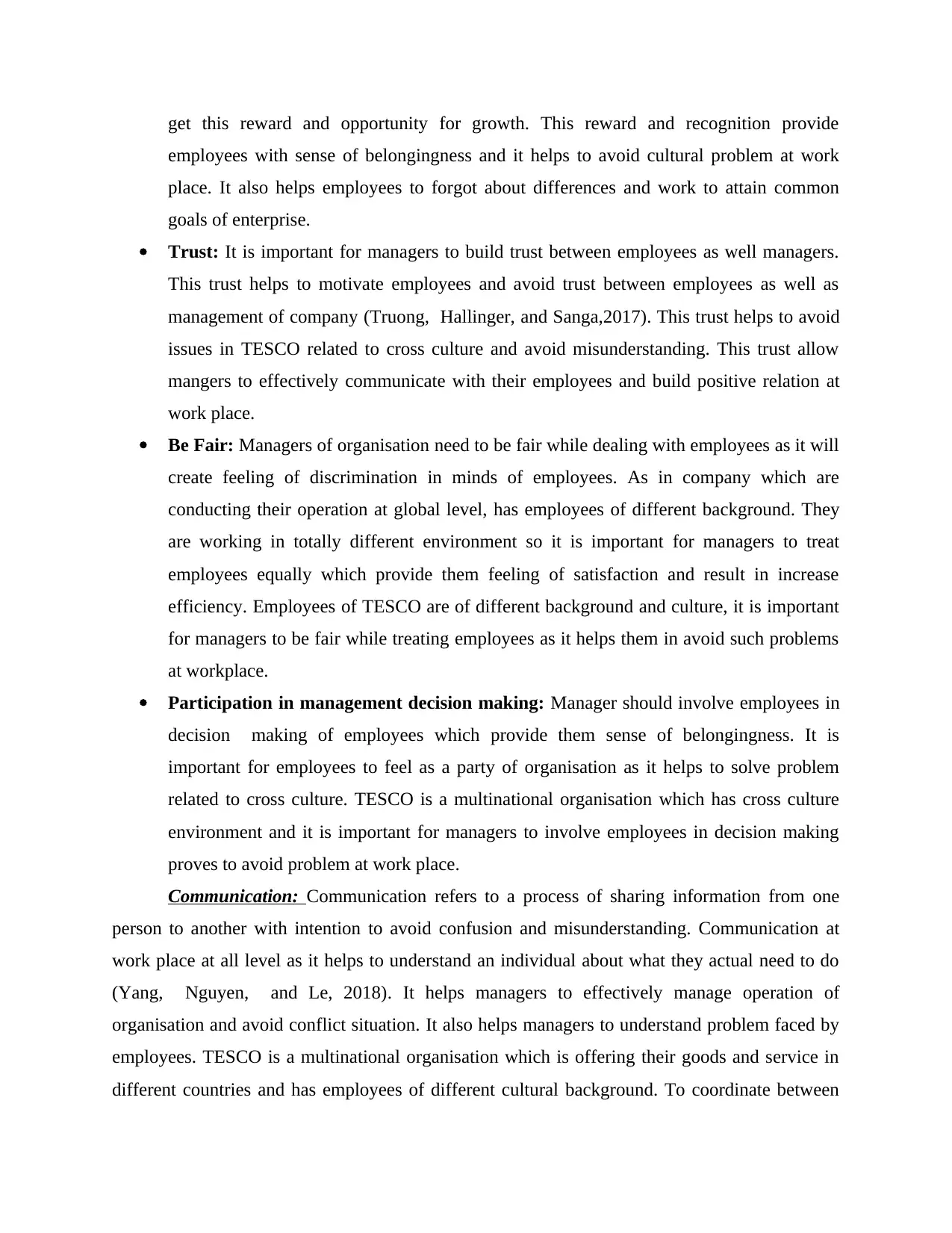
get this reward and opportunity for growth. This reward and recognition provide
employees with sense of belongingness and it helps to avoid cultural problem at work
place. It also helps employees to forgot about differences and work to attain common
goals of enterprise.
Trust: It is important for managers to build trust between employees as well managers.
This trust helps to motivate employees and avoid trust between employees as well as
management of company (Truong, Hallinger, and Sanga,2017). This trust helps to avoid
issues in TESCO related to cross culture and avoid misunderstanding. This trust allow
mangers to effectively communicate with their employees and build positive relation at
work place.
Be Fair: Managers of organisation need to be fair while dealing with employees as it will
create feeling of discrimination in minds of employees. As in company which are
conducting their operation at global level, has employees of different background. They
are working in totally different environment so it is important for managers to treat
employees equally which provide them feeling of satisfaction and result in increase
efficiency. Employees of TESCO are of different background and culture, it is important
for managers to be fair while treating employees as it helps them in avoid such problems
at workplace.
Participation in management decision making: Manager should involve employees in
decision making of employees which provide them sense of belongingness. It is
important for employees to feel as a party of organisation as it helps to solve problem
related to cross culture. TESCO is a multinational organisation which has cross culture
environment and it is important for managers to involve employees in decision making
proves to avoid problem at work place.
Communication: Communication refers to a process of sharing information from one
person to another with intention to avoid confusion and misunderstanding. Communication at
work place at all level as it helps to understand an individual about what they actual need to do
(Yang, Nguyen, and Le, 2018). It helps managers to effectively manage operation of
organisation and avoid conflict situation. It also helps managers to understand problem faced by
employees. TESCO is a multinational organisation which is offering their goods and service in
different countries and has employees of different cultural background. To coordinate between
employees with sense of belongingness and it helps to avoid cultural problem at work
place. It also helps employees to forgot about differences and work to attain common
goals of enterprise.
Trust: It is important for managers to build trust between employees as well managers.
This trust helps to motivate employees and avoid trust between employees as well as
management of company (Truong, Hallinger, and Sanga,2017). This trust helps to avoid
issues in TESCO related to cross culture and avoid misunderstanding. This trust allow
mangers to effectively communicate with their employees and build positive relation at
work place.
Be Fair: Managers of organisation need to be fair while dealing with employees as it will
create feeling of discrimination in minds of employees. As in company which are
conducting their operation at global level, has employees of different background. They
are working in totally different environment so it is important for managers to treat
employees equally which provide them feeling of satisfaction and result in increase
efficiency. Employees of TESCO are of different background and culture, it is important
for managers to be fair while treating employees as it helps them in avoid such problems
at workplace.
Participation in management decision making: Manager should involve employees in
decision making of employees which provide them sense of belongingness. It is
important for employees to feel as a party of organisation as it helps to solve problem
related to cross culture. TESCO is a multinational organisation which has cross culture
environment and it is important for managers to involve employees in decision making
proves to avoid problem at work place.
Communication: Communication refers to a process of sharing information from one
person to another with intention to avoid confusion and misunderstanding. Communication at
work place at all level as it helps to understand an individual about what they actual need to do
(Yang, Nguyen, and Le, 2018). It helps managers to effectively manage operation of
organisation and avoid conflict situation. It also helps managers to understand problem faced by
employees. TESCO is a multinational organisation which is offering their goods and service in
different countries and has employees of different cultural background. To coordinate between
Paraphrase This Document
Need a fresh take? Get an instant paraphrase of this document with our AI Paraphraser
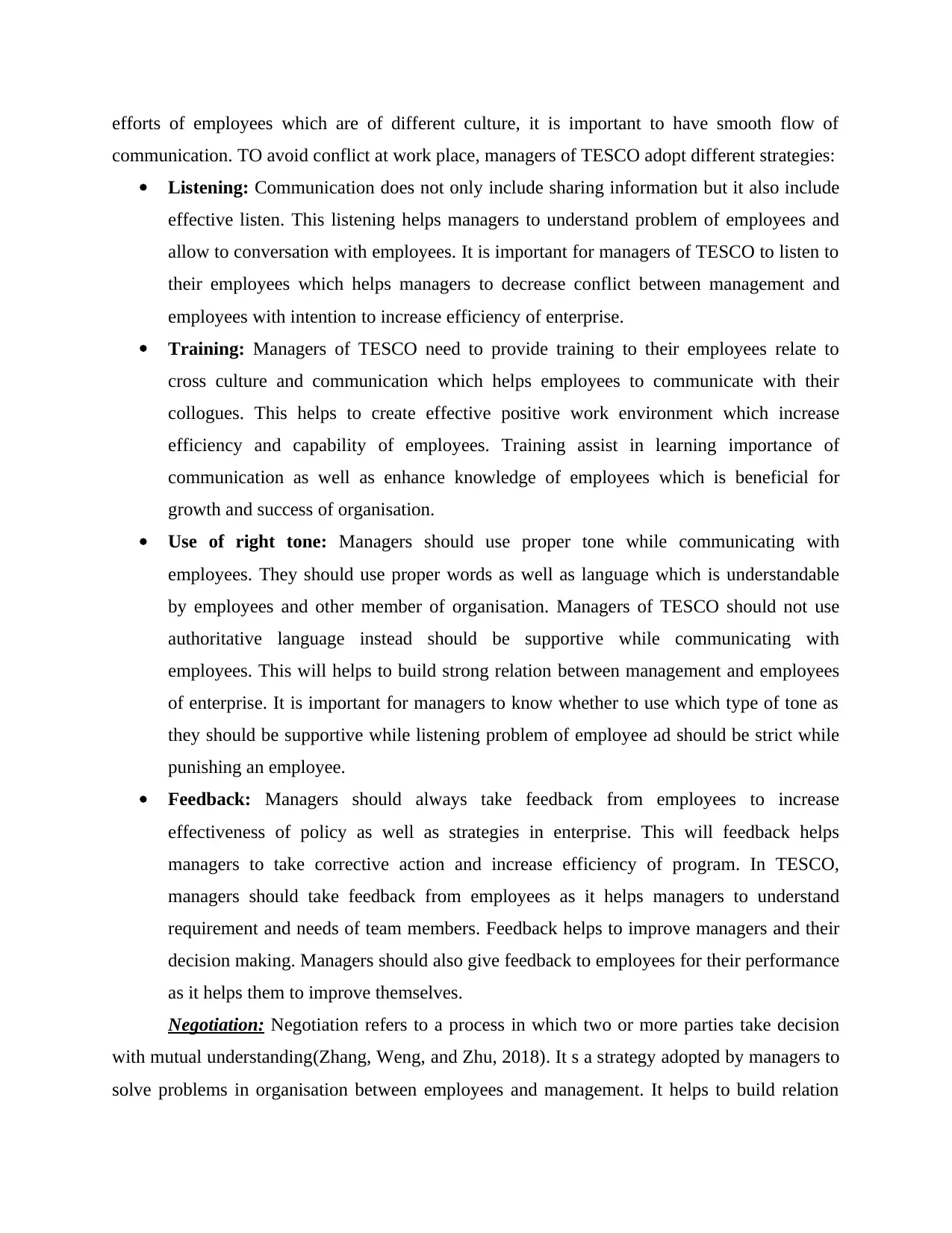
efforts of employees which are of different culture, it is important to have smooth flow of
communication. TO avoid conflict at work place, managers of TESCO adopt different strategies:
Listening: Communication does not only include sharing information but it also include
effective listen. This listening helps managers to understand problem of employees and
allow to conversation with employees. It is important for managers of TESCO to listen to
their employees which helps managers to decrease conflict between management and
employees with intention to increase efficiency of enterprise.
Training: Managers of TESCO need to provide training to their employees relate to
cross culture and communication which helps employees to communicate with their
collogues. This helps to create effective positive work environment which increase
efficiency and capability of employees. Training assist in learning importance of
communication as well as enhance knowledge of employees which is beneficial for
growth and success of organisation.
Use of right tone: Managers should use proper tone while communicating with
employees. They should use proper words as well as language which is understandable
by employees and other member of organisation. Managers of TESCO should not use
authoritative language instead should be supportive while communicating with
employees. This will helps to build strong relation between management and employees
of enterprise. It is important for managers to know whether to use which type of tone as
they should be supportive while listening problem of employee ad should be strict while
punishing an employee.
Feedback: Managers should always take feedback from employees to increase
effectiveness of policy as well as strategies in enterprise. This will feedback helps
managers to take corrective action and increase efficiency of program. In TESCO,
managers should take feedback from employees as it helps managers to understand
requirement and needs of team members. Feedback helps to improve managers and their
decision making. Managers should also give feedback to employees for their performance
as it helps them to improve themselves.
Negotiation: Negotiation refers to a process in which two or more parties take decision
with mutual understanding(Zhang, Weng, and Zhu, 2018). It s a strategy adopted by managers to
solve problems in organisation between employees and management. It helps to build relation
communication. TO avoid conflict at work place, managers of TESCO adopt different strategies:
Listening: Communication does not only include sharing information but it also include
effective listen. This listening helps managers to understand problem of employees and
allow to conversation with employees. It is important for managers of TESCO to listen to
their employees which helps managers to decrease conflict between management and
employees with intention to increase efficiency of enterprise.
Training: Managers of TESCO need to provide training to their employees relate to
cross culture and communication which helps employees to communicate with their
collogues. This helps to create effective positive work environment which increase
efficiency and capability of employees. Training assist in learning importance of
communication as well as enhance knowledge of employees which is beneficial for
growth and success of organisation.
Use of right tone: Managers should use proper tone while communicating with
employees. They should use proper words as well as language which is understandable
by employees and other member of organisation. Managers of TESCO should not use
authoritative language instead should be supportive while communicating with
employees. This will helps to build strong relation between management and employees
of enterprise. It is important for managers to know whether to use which type of tone as
they should be supportive while listening problem of employee ad should be strict while
punishing an employee.
Feedback: Managers should always take feedback from employees to increase
effectiveness of policy as well as strategies in enterprise. This will feedback helps
managers to take corrective action and increase efficiency of program. In TESCO,
managers should take feedback from employees as it helps managers to understand
requirement and needs of team members. Feedback helps to improve managers and their
decision making. Managers should also give feedback to employees for their performance
as it helps them to improve themselves.
Negotiation: Negotiation refers to a process in which two or more parties take decision
with mutual understanding(Zhang, Weng, and Zhu, 2018). It s a strategy adopted by managers to
solve problems in organisation between employees and management. It helps to build relation
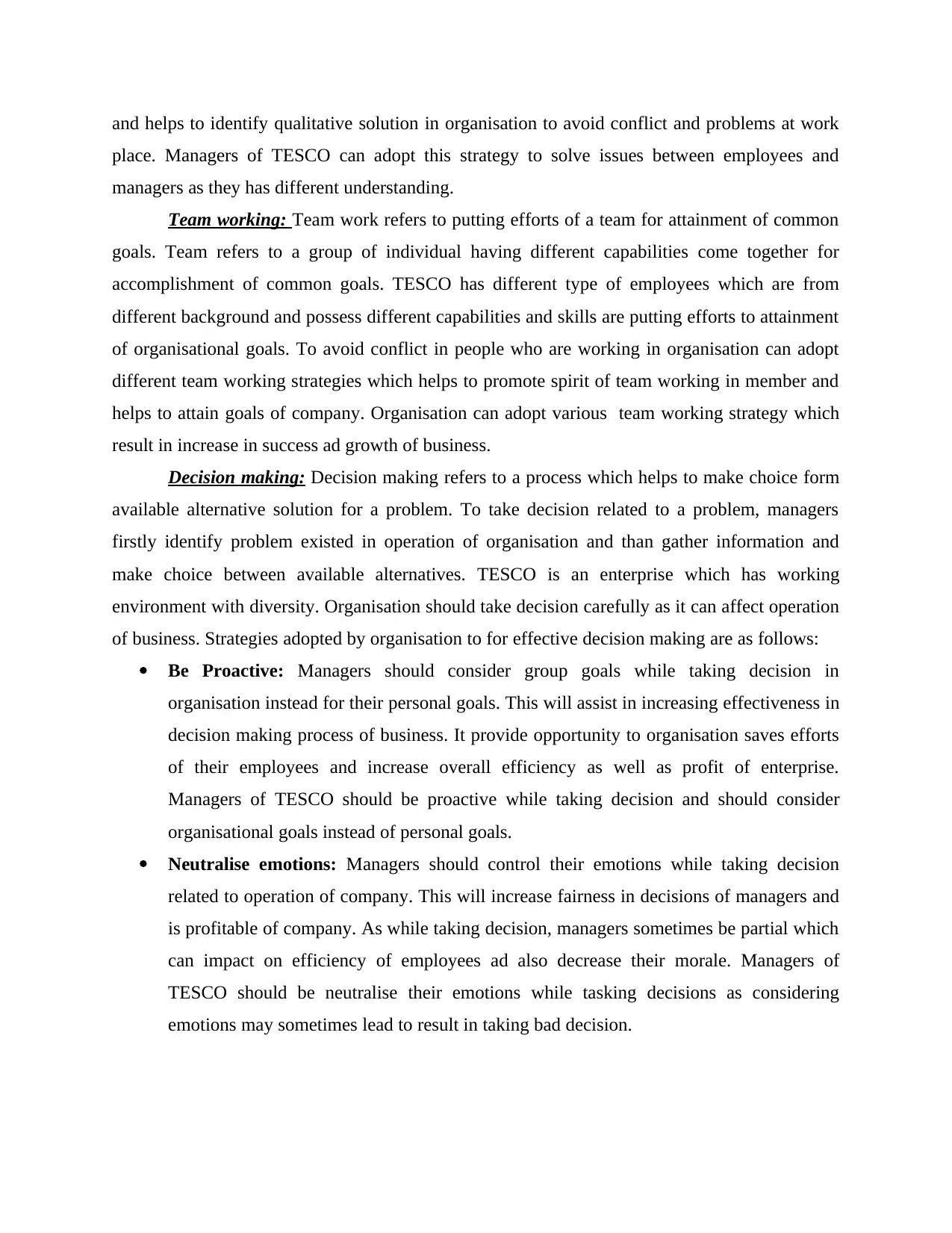
and helps to identify qualitative solution in organisation to avoid conflict and problems at work
place. Managers of TESCO can adopt this strategy to solve issues between employees and
managers as they has different understanding.
Team working: Team work refers to putting efforts of a team for attainment of common
goals. Team refers to a group of individual having different capabilities come together for
accomplishment of common goals. TESCO has different type of employees which are from
different background and possess different capabilities and skills are putting efforts to attainment
of organisational goals. To avoid conflict in people who are working in organisation can adopt
different team working strategies which helps to promote spirit of team working in member and
helps to attain goals of company. Organisation can adopt various team working strategy which
result in increase in success ad growth of business.
Decision making: Decision making refers to a process which helps to make choice form
available alternative solution for a problem. To take decision related to a problem, managers
firstly identify problem existed in operation of organisation and than gather information and
make choice between available alternatives. TESCO is an enterprise which has working
environment with diversity. Organisation should take decision carefully as it can affect operation
of business. Strategies adopted by organisation to for effective decision making are as follows:
Be Proactive: Managers should consider group goals while taking decision in
organisation instead for their personal goals. This will assist in increasing effectiveness in
decision making process of business. It provide opportunity to organisation saves efforts
of their employees and increase overall efficiency as well as profit of enterprise.
Managers of TESCO should be proactive while taking decision and should consider
organisational goals instead of personal goals.
Neutralise emotions: Managers should control their emotions while taking decision
related to operation of company. This will increase fairness in decisions of managers and
is profitable of company. As while taking decision, managers sometimes be partial which
can impact on efficiency of employees ad also decrease their morale. Managers of
TESCO should be neutralise their emotions while tasking decisions as considering
emotions may sometimes lead to result in taking bad decision.
place. Managers of TESCO can adopt this strategy to solve issues between employees and
managers as they has different understanding.
Team working: Team work refers to putting efforts of a team for attainment of common
goals. Team refers to a group of individual having different capabilities come together for
accomplishment of common goals. TESCO has different type of employees which are from
different background and possess different capabilities and skills are putting efforts to attainment
of organisational goals. To avoid conflict in people who are working in organisation can adopt
different team working strategies which helps to promote spirit of team working in member and
helps to attain goals of company. Organisation can adopt various team working strategy which
result in increase in success ad growth of business.
Decision making: Decision making refers to a process which helps to make choice form
available alternative solution for a problem. To take decision related to a problem, managers
firstly identify problem existed in operation of organisation and than gather information and
make choice between available alternatives. TESCO is an enterprise which has working
environment with diversity. Organisation should take decision carefully as it can affect operation
of business. Strategies adopted by organisation to for effective decision making are as follows:
Be Proactive: Managers should consider group goals while taking decision in
organisation instead for their personal goals. This will assist in increasing effectiveness in
decision making process of business. It provide opportunity to organisation saves efforts
of their employees and increase overall efficiency as well as profit of enterprise.
Managers of TESCO should be proactive while taking decision and should consider
organisational goals instead of personal goals.
Neutralise emotions: Managers should control their emotions while taking decision
related to operation of company. This will increase fairness in decisions of managers and
is profitable of company. As while taking decision, managers sometimes be partial which
can impact on efficiency of employees ad also decrease their morale. Managers of
TESCO should be neutralise their emotions while tasking decisions as considering
emotions may sometimes lead to result in taking bad decision.
⊘ This is a preview!⊘
Do you want full access?
Subscribe today to unlock all pages.

Trusted by 1+ million students worldwide
1 out of 15
Related Documents
Your All-in-One AI-Powered Toolkit for Academic Success.
+13062052269
info@desklib.com
Available 24*7 on WhatsApp / Email
![[object Object]](/_next/static/media/star-bottom.7253800d.svg)
Unlock your academic potential
Copyright © 2020–2025 A2Z Services. All Rights Reserved. Developed and managed by ZUCOL.





